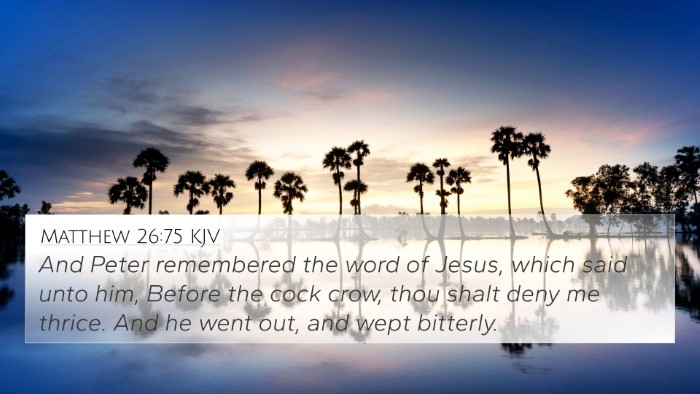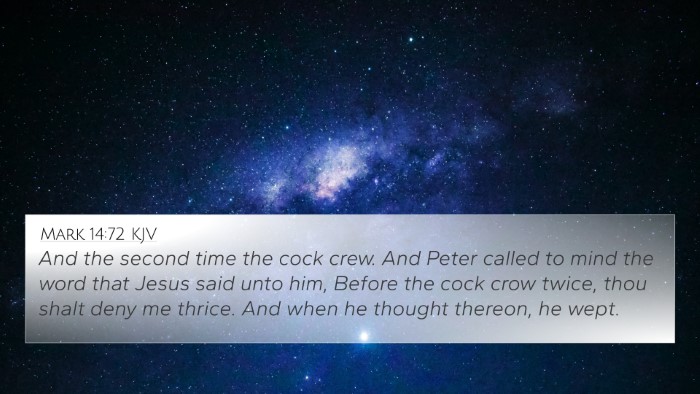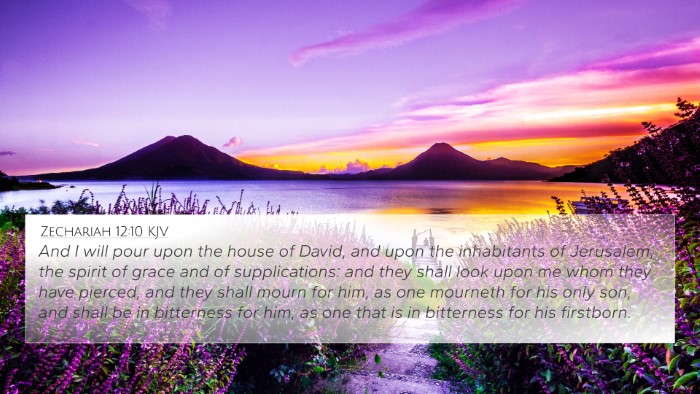Understanding Luke 22:62
Luke 22:62 states, "And Peter went out and wept bitterly." This moment captures the profound sorrow and regret of Peter after he denied Jesus for the third time. To fully appreciate the depth of this verse, we can draw insights from several public domain commentaries, including those of Matthew Henry, Albert Barnes, and Adam Clarke.
Contextual Overview
The context of this verse is essential. It occurs after Jesus has been arrested and taken to the high priest. Peter, who had earlier claimed he would never deny Jesus, finds himself in a situation of fear and pressure. The fulfillment of Jesus' prediction about Peter's denial brings a heavy burden of guilt upon him.
Matthew Henry's Commentary Insights
According to Matthew Henry, Peter's weeping signifies deep remorse. Peter had previously boasted of his loyalty, and now he faced the reality of his failure. Henry emphasizes that true repentance often comes after recognizing one’s fallen state, suggesting that this moment was crucial for Peter's spiritual renewal.
Albert Barnes' Perspective
Albert Barnes notes the psychological impact of denial on Peter. He points out that Peter's tears represent not only sorrow for his actions but also a recognition of his own weakness. This moment led Peter to a transformative journey towards grace, illustrating how God can use failure for greater purposes.
Adam Clarke's Analysis
Adam Clarke elaborates on Peter's emotional turmoil. He mentions the significance of the so-called 'look of Jesus' which may have pierced Peter’s heart, prompting his tears. Clarke highlights that this moment signifies the difference between worldly sorrow and godly repentance, which leads to salvation.
Thematic Connections
This verse not only stands alone but also connects to several themes throughout Scripture. Here are some significant Bible verse cross-references that relate to the experiences represented in Luke 22:62:
- John 21:15-17 - Jesus restores Peter after his denial, showing the theme of forgiveness.
- Matthew 26:75 - Similar account of Peter's denial and his subsequent remorse.
- 2 Corinthians 7:10 - Contrasts godly sorrow leading to repentance with worldly sorrow.
- Psalm 51 - David's lament for his sins, reflecting a heart of repentance.
- Mark 14:72 - Another Gospel account of Peter's denial and grief afterwards.
- Acts 2:14-38 - Peter’s boldness after Pentecost illustrates his transformative journey.
- Romans 8:1 - Assurance of no condemnation reflects the essence of grace Peter would come to realize.
- Galatians 6:1 - Emphasizes the restoration of those who have fallen, relevant to Peter's eventual reinstatement.
- 1 Peter 5:10 - Peter reflects on suffering and restoration, tying back to his earlier experiences.
- Hebrews 12:1-2 - Encouragement in running the race of faith, paralleling Peter's renewed mission after denial.
Inter-Biblical Dialogue
Luke 22:62 invites readers to engage in a deeper inter-Biblical dialogue. The connections between the Old and New Testament regarding failure, repentance, and restoration are prevalent. Understanding these connections enhances the interpretation of Peter's experience as part of a broader narrative of redemption.
Tools for Bible Cross-Referencing
To effectively study this and related verses, one can utilize various tools for cross-referencing:
- Bible concordance for keyword search.
- Bible cross-reference guide for thematic connections.
- Cross-reference Bible study methods for comparative analysis.
- Comprehensive Bible cross-reference materials for deeper exploration.
Conclusion
Luke 22:62 serves as a poignant reminder of human frailty and the possibility of redemption. Through cross-referencing and understanding the narrative arcs in Scripture, we can appreciate the powerful themes of denial, repentance, and forgiveness that resonate throughout the Bible. The tools and methods of cross-referencing allow us to interpret these themes more fully, bringing light to the intricate connections between Bible verses.














